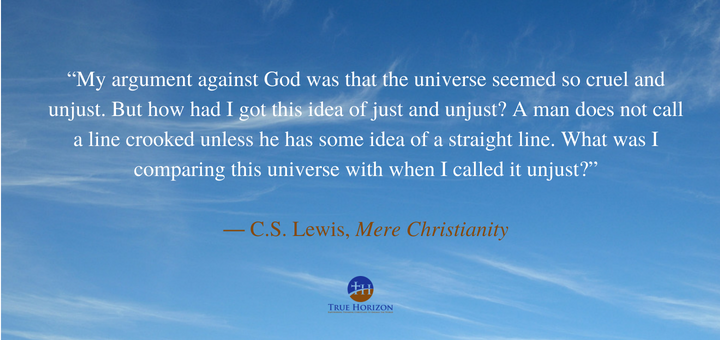The Reality of Objective Good
Moral principles are foundational to reality. They also include topics that will be the most likely sources of skepticism, disillusionment, debate, and objection you will ever encounter. In order to understand, articulate, and defend the truth of Christianity, you have to be able to explain the foundation for moral values. Why is there evil in the world if God is so good? How could a good God allow all this pain and suffering? Who are you to say what’s right and wrong?
You will confront these issues in various forms. But, no matter how you do, there are two main points that you should always keep in mind.
Two Important Points
1. Complaints about evil assume that there is actual evil in the world.
2. Every worldview needs to be able to explain it.
It is important to always keep these two points tied together. Every complaint you will ever hear that uses morality to deny the existence of God violates one of them. Our goal is to show that theism is the most reasonable explanation for the existence of evil in the world. And that God’s character is the source of ethical solutions to our moral dilemmas.
The Formal Moral Argument
The formal moral argument for God goes like this:
- If God does not exist, objective moral values do not exist.
- Objective moral values do exist.
- Therefore, God exists.
This argument says that if we claim that there are moral values we have to have a standard by which we measure them. And that standard has to be objective — it has to be outside of us. It cannot be subjective. It cannot just be our opinion.
Everyone recognizes that there is an endless array of evil things that bad people do in this world. That fact is not even debatable. But when we claim that something is actually bad, we are presupposing that there is a standard we use to judge it.
So, what kind of standard is it?
The Standard Can’t Be Personal Opinion
It seems pretty obvious that we can’t all just make up our own, personal definitions of what is right and wrong. Can you even begin to imagine the chaos that would generate? We all recognize that people do good things and evil things. But saying moral values are up to each individual to decide for themselves would not allow us to judge anyone’s behavior as being immoral.
This view is obviously ridiculous. And there really aren’t any serious people who believe such a thing. But let’s take this idea to the next level. Let’s say that communities of people can come to a consensus to decide what is good and bad. Does that work better?
The Standard Can’t Be Decided By Consensus
Basing moral truth on the consensus of some community fails for the same reason personal opinion fails. The fact that we can get a group of people to agree on some moral standard doesn’t make it right. We don’t decide what is right and wrong by popular vote. If you doubt that, let me offer you a couple of historical examples to consider.
A majority of the German public voted Adolf Hitler into office in the mid-1930s. Does the fact that a majority of the German people agree with Hitler’s political promises mean his policies were morally acceptable?
And what about the American south in the mid-1800s? The consensus opinion in that part of the country at that time was that slavery was just fine. Did that make slavery morally acceptable?
You see the problem. The fact that a community comes to a consensus about something doesn’t make it right. Neither does the fact that something is legal, make it right.
Identifying The Standard
So, if personal opinion and community consensus aren’t good ways to ground moral standards, what is?
Three things are important in recognizing the standard we all use to judge things as being good or bad, right or wrong.
1. Moral obligations are always between persons. You don’t have any moral obligation to the chair you’re sitting in or the computer you’re reading this on. We all recognize that moral obligations can only be between moral agents.
2. Moral values require a scoring system we use to measure them. Think about what makes a “good” golfer. It’s not his caddy, the clothes he wears, the brand of golf ball he uses, or his determination or sincerity about playing the game of golf. There is only one way to determine who is a good golfer. You must compare the score a golfer shoots to par. The scoring system resides outside the golfer. Moral values are no different.
3. Only someone with moral authority can enforce a moral code. I can’t plant a “Speed Limit 70” sign on the residential street in front of my house. I have no authority to do so. In order to hold someone accountable for breaking a law, someone must have created the law. And that someone must have the authority to do so.
The source of the morality we all recognize to exist must be personal, objective, and have the authority to enforce the rules. It’s no coincidence that these are three traits that describe the God of the Bible.
Good And Atheism
Remember the importance of keeping the two points I mentioned at the beginning linked together. First, there is actual evil in the world. Second, everyone — atheists included — needs to be able to explain it. Here’s why:
To an atheist, there is no moral lawgiver. There is no objective standard for moral values. The atheist recognizes the evil in the world but has no way to explain what makes something good or bad outside of someone’s — or some group’s — opinion.
If there is no moral lawgiver, there can be no moral law.
This doesn’t mean an atheist can’t be good. And it doesn’t mean an atheist can’t do good things. It just means that atheists can’t explain why something is good. Greg Koukl gives a nice, compact explanation of this here:
Goodness Depends On God
We can’t have moral laws without a Moral Lawgiver. It’s parallel to Greg Koukl’s illustration (in the video) of being able to read books while simultaneously claiming that there is no such thing as an author.
We are simply acknowledging the objective nature of the moral world we live in. All of us live our lives as if the standard is here. We can’t deny it. The Moral Argument simply says that the only way to account for that moral standard is by grounding it in a source outside of all of us.
The moral values we all recognize depend on the existence of God. Goodness is grounded in the character of God himself.
Another Form Of Truth
Elsewhere, I have talked about why a good God would allow evil in the world. But the point here is more basic. It’s about understanding the difference between being good without God — and being good without a belief in God. Anyone can do the latter. But none of us can do the former.
Goodness exists outside of us — it’s objective. It’s a fundamental characteristic of the world in which we live. We don’t create it. We recognize it. And we feel guilty when we violate it.
Goodness is just another form of truth.





